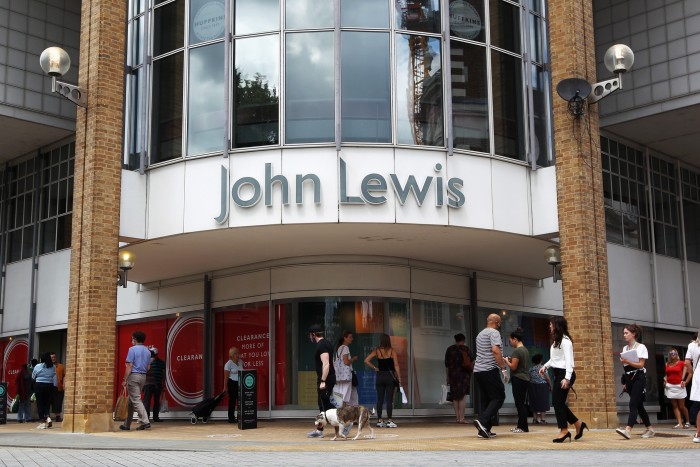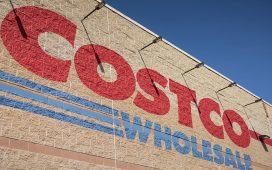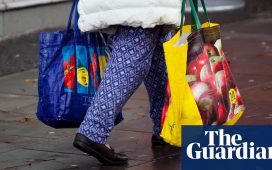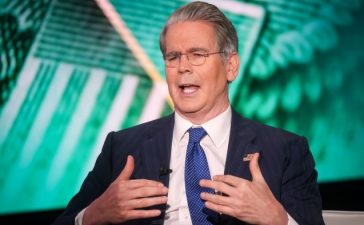Jason Tarry likes a challenge. He was one of the few senior employees left standing at Tesco in 2014 after the UK’s largest supermarket was rocked by an accounting scandal and many were sacked or left the business.
Picked by then-boss Dave Lewis to help clean up the mess, he was promoted to UK chief executive four years later, having mended the grocer’s broken relationships with mistreated suppliers.
Tarry is now taking up one of the toughest jobs in retail — chair of John Lewis Partnership — after more than three decades at Tesco.
It was an “outstanding” appointment, said Lewis, now an operating adviser at US private equity firm Clayton, Dubilier & Rice. It puts Tarry in the driving seat as the owner of department store John Lewis and upmarket grocer Waitrose enters the next chapter of a painful turnaround after almost five years under Dame Sharon White.
The £12bn employee-owned group crawled back to a pre-tax profit of £56mn in 2023 following three years of losses, but did not pay its prized staff bonus for the second year in a row — only the third time it had not paid the award since 1953. Meanwhile, it has been grappling with high levels of debt and increased competition from nimbler rivals as well as surging inflation, as it seeks to save almost £1bn in costs by 2028.
Tarry, a dyed-in-the-wool retailer, is a stark contrast to White, who had no retail experience prior to her arrival at John Lewis Partnership.
The new chair “couldn’t be more different to his predecessor — almost an admission of the mistakes of the last four years”, a former senior John Lewis employee said.
John Lewis said its “plan is working”, as “demonstrated by our return to profit”.

During her tenure White, a former civil servant, shut 16 John Lewis shops and slashed thousands of jobs, simplifying both businesses to place the group on a firmer financial footing. However, some of her efforts have weighed on the customer service that made the partnership famous and hurt staff morale.
“There has been a sense of frustration [internally] that the business has not been focusing on the right things and that it has been drifting away from retail,” said Neil Saunders, managing director of GlobalData Retail and a former John Lewis employee.
“The blunt truth is that many in the business never thought she was the right person for the job because of her lack of retail experience,” he added, though he conceded that White, who joined from media regulator Ofcom in 2020, “has started to correct this of late”.
Last year she appointed Nish Kankiwala, whose background is in consumer goods, as the partnership’s first chief executive. Together they devised a new strategy that would “unashamedly” focus on retail, in a move away from White’s earlier vision to derive almost half the group’s earnings from building homes to rent and from financial services by 2030. Tarry is supportive of the current strategy and Kankiwala, according to John Lewis.
The Tesco veteran, who has worked at the grocer since joining its graduate scheme in 1990, grew up in a farming village in Kent, where his father worked for the local council and his mother was a seasonal farmworker. The first in his family to go to grammar school and into further education, he earned a degree in business studies from Staffordshire University. He joined Tesco initially as a path to qualifying as an accountant and moving to Australia, but he ended up staying.
Sir Terry Leahy, who spent 32 years at Tesco and ran it from 1997 to 2011, said Tarry stood out when he went from working in the food arm into its fashion business F&F, “which is a hard move to make if you have no background in clothing”.
“He did that very successfully and he showed a remarkable ability to listen and learn and he had a broad range of talents,” Leahy said.
F&F was the UK’s seventh-largest fashion retailer during Tarry’s tenure, he said. At John Lewis he will work with Peter Ruis, a well-respected retail executive who recently returned to the group to revamp its department stores.
Tarry joins at a time when John Lewis is under pressure to compete with rival Marks and Spencer, which GlobalData forecasts will continue to gradually increase its market share in the UK clothing and footwear sector between now and 2027, while John Lewis’s share is expected to stagnate. Waitrose is only slightly ahead of M&S in the grocery market, with a 3.6 per cent market share this month versus the latter’s 3.4 per cent, according to data provider NIQ.

Tarry will take on a role, enshrined in the partnership’s constitution, that has changed over the years from being somewhat ceremonial — representing the interests of employees and promoting the business — to a more hands-on position, said Saunders. “It needs someone with deep retail expertise.”
His commercial nous, gained from working across grocery, general merchandise and fashion at Tesco, is also expected to help him navigate John Lewis’s limited financing options dictated by its unusual structure. The group plans to pay a £300mn bond this year using its own cash reserves, and to improve its profits and its debt ratio.
The retailer also said it would inject more than £2.4bn over the next four years into its operations to accelerate growth, funded by internally generated cash flow, and would open more Waitrose stores and refurbish existing ones for the first time in almost a decade.
Tarry has “all the retail experience and commercial knowledge required for the role but it’s his personal warmth and values that make him such a great fit”, Lewis said.
He added that Tarry had been “a critical part of the Tesco turnaround, first as chief commercial officer and later as UK and Ireland CEO”.
“I never thought I’d end up where I ended up,” Tarry recounted in a 2020 conversation with media platform Worth of Mouth. “If there is an opportunity in front of you, if you haven’t got a really good reason not to take it, then take it because you don’t know where it could lead you to.”
He is a good leader and “a decent human being”, according to another former Tesco colleague, with an ability to pull different teams together to effect change.
“I don’t think he will come in and ‘Tescofy’ John Lewis,” said Clive Black, a retail analyst at Shore Capital.
“They are different: one is a mass-market, functional organisation that has to face everybody; John Lewis is a premium, service-led organisation. I don’t worry he will come in and think he will apply a Tesco culture to John Lewis.”









